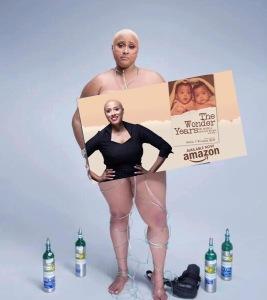
WonderTwinz 5K Walk|Run For A Cure
Sub-events Details
WonderTwinz 5K Walk|Run For A Cure
Event details
On April 29, 2017, Davica and Demetria Williams of The WonderTwinz launched the inaugural 5K Walk|Run for a Cure to raise advocacy and awareness for Scleroderma, a rare chronic autoimmune disease that disproportionately affects young women aged 12 to 50. The WonderTwinz gained national notoriety when their story went viral on various social media platforms. Their collective voice of advocacy led them to become Ambassadors for The Scleroderma Research Foundation. Demetria's Systemic Scleroderma docu-series, "Into The Life of The WonderTwinz" by Joe Wesley, "I Dare You To Live," and "I Dare You To Believe" by Dr. Arshley Emile were collectively used for their 2017 Capital Campaign for Research, which raised over $250,000 for scleroderma research. Additionally, The WonderTwinz represented The Scleroderma Research Foundation on Scleroderma Day on the Hill to advocate for more than $1 million of government funding to be used for scleroderma cure research. To date, there is no cure, with over 300,000 Americans diagnosed.
Unfortunately, on June 2, 2018, Demetria Williams passed away in her sleep due to cardiac arrest after battling five rare and chronic Autoimmune Diseases, with Systemic Scleroderma being the prominent disease affecting her health. Demetria's transition during June will always have significance as it's Scleroderma Awareness Month. June 29th is World Scleroderma Day, and we walk in Demetria Williams' honor. Demetria declared that she would be the face of Scleroderma in the City of Miami Gardens, The State of Florida, and beyond. She was adamant that minority women advocate for themselves when it comes to their health. Had her doctors listened to her concerns regarding her health early on, Systemic Scleroderma treatment could have prolonged its rapid progression in her case. The weight of grief prevented her twin sister Davica William from continuing her advocacy legacy with the 5K Walk. However, she has been inspired to pick up the baton.
Davica states the reinstated annual event originated at Betty T. Ferguson Recreational Complex, and I hope to continue the rich legacy we began seven years ago. The community event will feature music, light bites, health vendors, local business owners, and a hydration station for walkers and runners to unite in Demetria's honor.
For More Information on Scleroderma:
Scleroderma is a chronic autoimmune disease characterized by the thickening and hardening of the skin. Some forms of the disease also affect the blood vessels, muscles, bones, and other internal organs.
There are two broad categories of scleroderma. Localized scleroderma affects the skin and subcutaneous tissue (the deepest layer of the skin) and sometimes the underlying muscle or bone. This is the most common type of scleroderma. Systemic scleroderma, also called systemic sclerosis, affects the skin and internal organs, such as the heart, lungs, gastrointestinal tract, kidneys, and blood vessels. Systemic scleroderma is usually more serious than localized scleroderma and can cause damage to internal organs, which may lead to health complications or even death.
Scleroderma is a rare condition. According to the National Scleroderma Foundation, the condition affects around 300,000 people in the United States. (Around 200,000 people have localized scleroderma, while about 100,000 have systemic scleroderma.) Both localized and systemic scleroderma are more common in women than in men. Both forms of the disease can affect people of any age, but systemic scleroderma is most commonly diagnosed in people between ages 20 and 50 and rarely occurs in children.
There is no cure for scleroderma. In many cases, damage caused by the condition cannot be reversed. However, treatments are available that may alleviate symptoms and lessen further skin or organ damage. (source: https://www.yalemedicine.org/conditions/scleroderma)